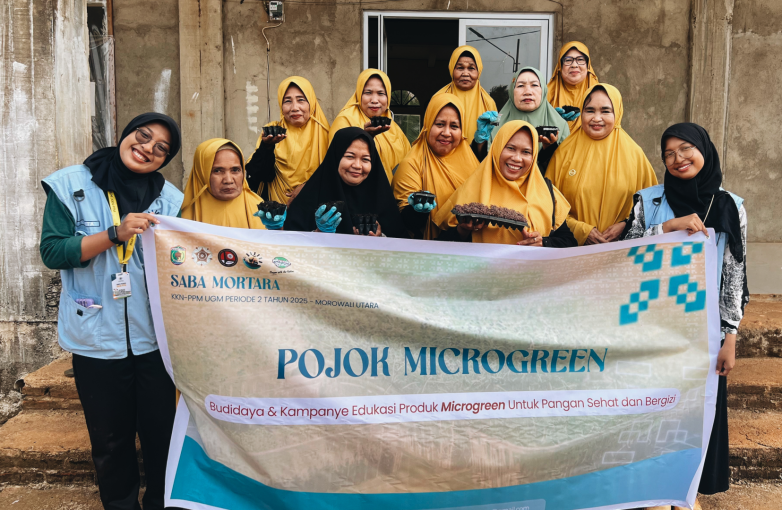
Lalita Amaranggana Priyahita, a student from the Agricultural Economics and Agribusiness Department, Faculty of Agriculture at Universitas Gadjah Mada (UGM), recently completed her Community Service Program (KKN) in Bungintimbe Village, Petasia Timur Sub-District, North Morowali Regency, from July 25 to August 3, 2025. Under the theme “Optimizing Environmental Management, Disaster Resilience, and Sustainable Tourism Development through Community Empowerment,” Lalita and her team implemented key programs, including the Green School Movement, Disaster-Ready School Initiative, and Village Food Security Program. These initiatives were carried out in collaboration with strategic partners such as PT Stardust Estate Investment, PT Agro Nusa Abadi, the North Morowali BPBD, and the North Morowali Local Government.
One of the most memorable moments for Lalita was collaborating with the village youth group to build a maggot house. This activity not only fostered closer ties with the community but also provided a platform for exchanging ideas and understanding the village’s demographic dynamics. “I felt a deeper connection with the villagers, sharing laughs and gaining insights into their way of life,” said Lalita, who actively shares her experiences on her social media account, @lalitaa-ap. Additionally, Lalita successfully introduced maggot and microgreen cultivation, which the community warmly embraced and immediately applied. This initiative has opened new avenues for supporting food security and environmental management in the village.
Despite these achievements, the KKN journey was not without challenges. As a semi-urban area where most residents work in the mining industry, reaching out to the community proved difficult. Many villagers were unable to attend activities due to their work commitments, even though the programs were aligned with routine events like PKK gatherings. Through patience and consistent engagement, Lalita and her team managed to build meaningful relationships with some community members, fostering impactful collaboration.
This experience left a profound mark on Lalita. “I’ve become more grateful for the access to quality education and opportunities I have in the city,” she shared. She also took pride in sharing her knowledge and witnessing its tangible impact. To students preparing for their KKN, Lalita advised, “Seize this opportunity to explore as much as possible and grow beyond your comfort zone. You’ll encounter extraordinary people and experiences.” She also suggested that the Faculty of Agriculture, particularly the Socio-Economics Department, provide more comprehensive training on common community issues to better prepare students.
This KKN aligns with several Sustainable Development Goals (SDGs). First, SDG 4: Quality Education, through the Green School Movement, which promotes environmental awareness among students. Second, SDG 11: Sustainable Cities and Communities, reflected in the community empowerment efforts for environmental management and disaster resilience. Third, SDG 2: Zero Hunger, achieved through the village food security program by introducing maggot and microgreen cultivation. Through this KKN, Lalita and her team have made a tangible contribution to Bungintimbe Village while enriching their own perspectives as agents of change.
Author: Adhika Hafizh Prasada, S.P.
Admin of the Website for the Department of Agricultural Socio-Economics, Faculty of Agriculture, UGM
